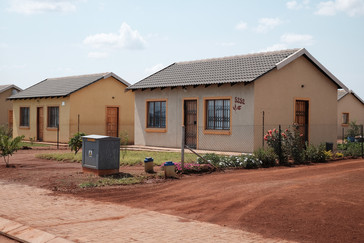ROSSLYN, South Africa – Four years of community building, 200 lives changed completely - this is the legacy of Nissanda (Nissan Development Area), a housing project in GA Rankuwa Zone 10 in Pretoria.
Fifty different families now have a place to call home as a result of the work that has been done at Nissanda since it was first established in 2013 to help address the city's housing backlog.
The result of a partnership between the City of Tshwane, Habitat for Humanity and Nissan, there are few places where the spirit of Ubuntu is more evident than the thriving Nissanda community.
Residents of Nissanda are family units who previously would have had no choice but to stay in shacks or overcrowded houses, some of them not even having a room per family.
Steve Modiga belongs to one such family. He lives at Nissanda with his wife and three children. A respected elder within the community, Modiga was dealt a difficult hand in terms of his health. With a tumour on his lung that needed to be removed, he has found himself in and out of hospital on a frequent basis.
As a result, his financial costs were adding up. But having been given his own home at Nissanda has provided Modiga with much-needed financial security. "I feel happiness and contentment," he says. "This house is the best gift I have ever received. I never imagined living somewhere like this and I really appreciate what Nissan and its partners have done for us."
Keba Matlhako, Nissan SA's manager for corporate social responsibility, says having a home at Nissanda means so much more to its residents than simply having a place to stay. "Having a place to call their own gives them a sense of ownership and value. It improves the image they have of themselves and gives them a higher sense of self-respect."
Having a home and an address is equivalent to having an identity document, restoring dignity to these families, he says.
Creating a sense of ownership
Since it was first established, the project has progressed beyond the construction of houses, now helping occupants to take greater ownership of their homes. To enable this, Nissan has set up a social facilitation programme, identifying key people within the community to form part of a structured community representative forum. "This was done to encourage greater community participation," says Matlhako.
Orchards were also planted across the community some time ago. These have now started to yield fruit in the form of oranges.
Matlhako says it's greatly encouraging to see how the residents of Nissanda have really looked after their properties. "There's a real sense of community now that the representative forum has been established," he says.
"There is a great sense of togetherness at Nissanda," agrees Modiga. He says it took time for the residents within the community to get to know one another, but now they are like a family.
Nissanda's ability to impact the lives of the people in Ga-Rankuwa has also benefitted Nissan significantly, as the company draws most of its labour from the community. "As a result of the project, our relationship with the community has improved, which we are really pleased about," says Matlhako.
Growth and innovation
The total eradication of informal settlements remains an important goal of Nissan's work. To this end, the company will look at building homes in Nissanda for an additional 28 families.
It will also look at enhancing the developments which already exist.
While phase one of the housing project was focused more on traditional brick and mortar building processes, the second part of the project will incorporate the use of more innovative technologies. For example, houses will be insulated to make them more comfortable for occupants during the summer and winter months. New building processes will also allow structures to be erected more easily and in a shorter space of time.
Once phase two is complete, Nissan will re-evaluate where the needs lie in terms of the delivery of homes, investigating which other projects it can get involved in.
"We will continue to build sustainable communities through housing projects – this is part of Nissan's commitment to enriching people's lives," says Matlhako.
# # #









